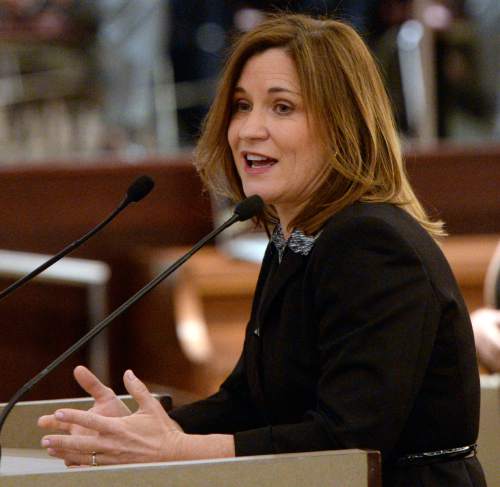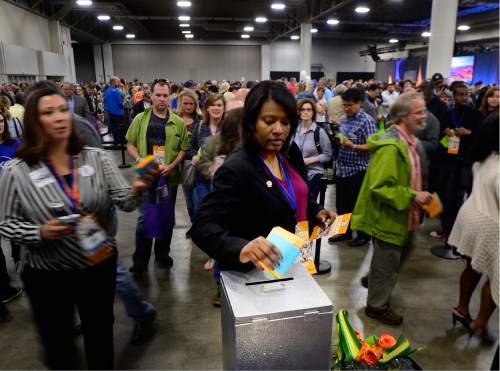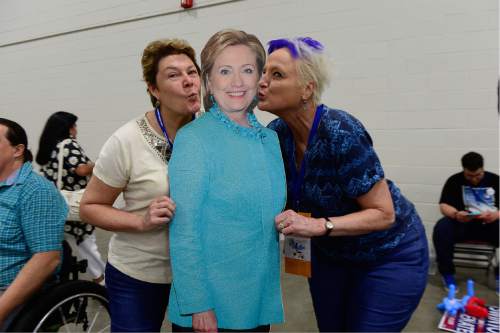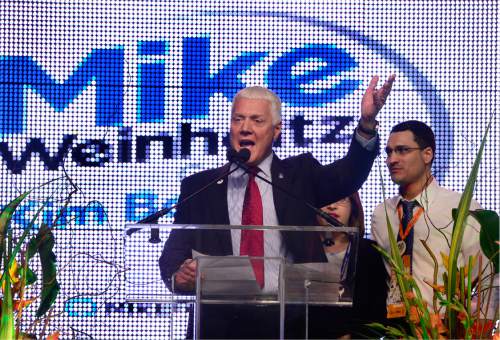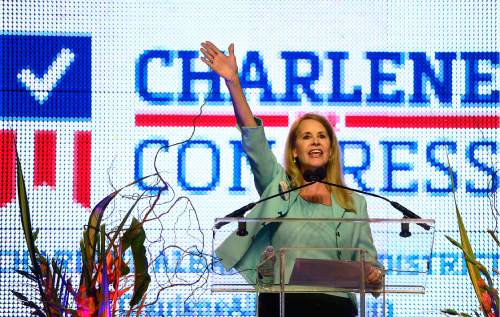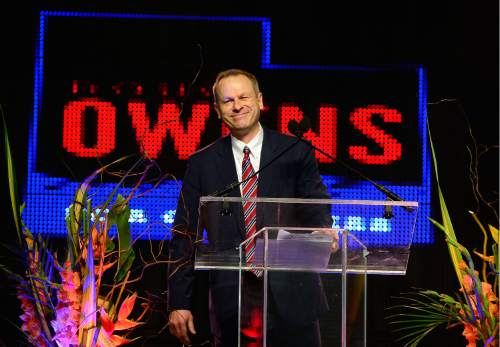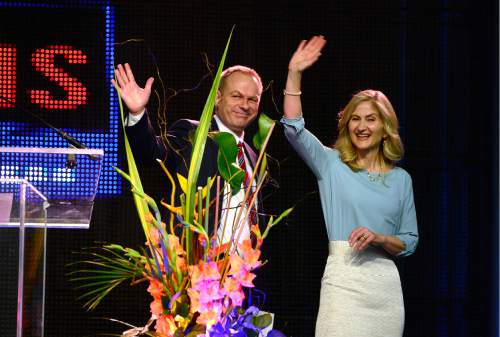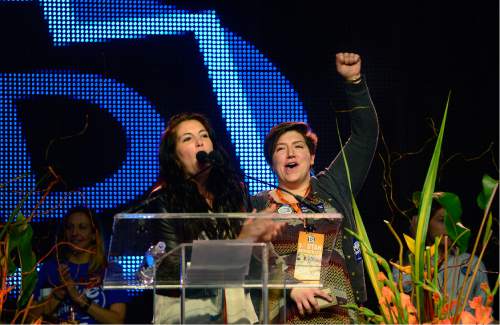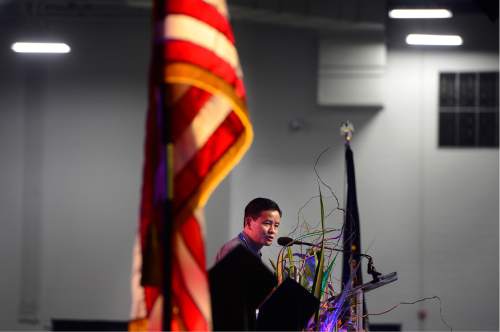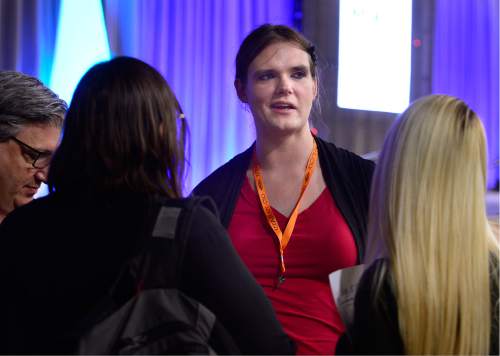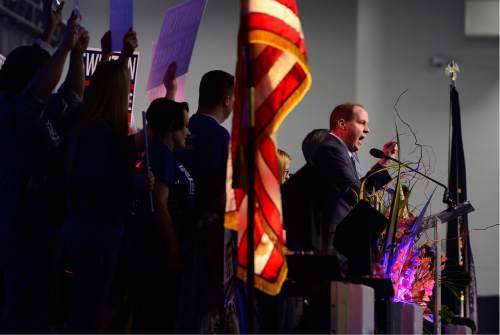This is an archived article that was published on sltrib.com in 2016, and information in the article may be outdated. It is provided only for personal research purposes and may not be reprinted.
Mike Weinholtz won the Democratic gubernatorial nomination with 80 percent of the delegate vote on Saturday, but before he did, he disclosed that his wife, Donna, is being investigated for marijuana possession, saying she uses the illegal drug to treat severe arthritis and nerve pain.
"She has only used cannabis for medical reasons for the relief of chronic pain," Weinholtz said in a speech before a crowd of nearly 2,000 Democrats at the Salt Palace Convention Center. His disclosure drew supportive applause and a partial standing ovation. "The issue of the need for medical cannabis touches everyone."
And that includes the man who ran against Weinholtz for his party's nomination. Vaughn Cook told The Salt Lake Tribune in an interview that he considered using marijuana to treat cancer, but decided the criminal implications weren't worth it. But he didn't criticize the Weinholtzes.
"I have great empathy for Donna and her plight," he said before failing to capture 40 percent of the delegate vote and therefore being eliminated. "I wish her the best."
He added: "I wouldn't advise anybody to use cannabis oil in this state when it is illegal, but I certainly wouldn't condemn anyone who does. I think we need to legalize it."
Weinholtz and his campaign team quickly left the convention area after his speech. He later called The Tribune and said police officers came to his Salt Lake City home on Wednesday to talk to his wife and inform them of the investigation.
He decided to address it in his convention speech because not doing so would go against his pledge to be transparent and would "even be dishonest." He thought delegates deserved to know before they voted.
Weinholtz said he doesn't use marijuana and wasn't worried that disclosing that his wife does would get her into deeper legal trouble.
"It is factual and it is for medicinal reasons," he said.
Salt Lake County District Attorney Sim Gill said he knew about the investigation before the convention, but claimed a conflict due to his relationship with Weinholtz, whom he has endorsed and considers a friend. Gill is not involved in the matter, which has been shifted to Chief Deputy D.A. Blake Nakamura.
Gill, a supporter of legalizing marijuana for medical purposes, said Weinholtz's admission at the convention showed "incredible courage."
"It speaks volumes for who he is as an individual," said Gill. "I think that was his finest moment."
As the candidate wrapped up his speech, Donna Weinholtz walked onstage, hugged her husband and waved to the crowd. A delegate to the 2012 Democratic National Convention, she was also one of 13 liberals arrested at the state Capitol in 2014 during a demonstration in support of anti-discrimination legislation focused on the state's gay and lesbian community.
Up until this point, the race between Weinholtz and Cook has focused more on the issue of electability than differences on the issues. In his convention speech, Cook identified himself as a "native son" of Utah who would be more palatable than Weinholtz to the independents and crossover Republicans that a Democrat would need to win in a statewide race.
"If we give the voters of this state a pill they won't swallow what good have we done," he said.
In the interview, he said his campaign conducted a focus group that showed that potential crossover voters would favor a candidate born in Utah. His research also showed that these voters would give a second look to a Mormon.
Weinholtz was born in Buffalo, N.Y., and isn't LDS.
In conversations with delegates earlier in the day, Weinholtz said he found the electability question "insulting to Utah voters" and said he was the "proud progressive" in the race.
He will face either Gov. Gary Herbert or Overstock.com Chairman Jonathan Johnson. Those two Republicans will face off in a June 28 primary.
The convention also saw a contested race for the party's U.S. Senate nomination, hinging on abortion. Misty K. Snow forced a primary with Jonathan Swinton, who was seen as the most likely to win the nomination outright.
Snow's supporters have hounded Swinton, a marriage counselor, over the past few weeks for saying he was pro-life. He tried to duck the issue at the state Democratic convention, saying he'd set his personal opinion aside and follow the will of the majority of Utah voters — which would still mean he would vote to limit abortion rights.
"The reality is that is my job. My job is to all of my constituents," Swinton said in an interview. "If that isn't Democrat enough for them then that is too bad."
Swinton got jeered during a visit to the women's caucus earlier in the day and Snow's supporters reminded delegates waiting in line to vote that Swinton was anti-abortion.
Campaigning in line is against party rules and Swinton objected to party leaders when he learned he didn't win the nomination outright. Swinton argued that he was the most electable Democrat in the race.
Jade Tuan Quoc Vo also ran for the Senate nomination and was eliminated in the first ballot.
If Snow wins the primary, she'd be the first transgender person to win a major party congressional nomination in Utah. The winner of the Democratic primary will face Sen. Mike Lee, R-Utah, in November.
The Democrats had no contested state legislative seats. The delegates elected Salt Lake County Council member Jenny Wilson to serve as the new national committeewoman and attorney Charles Stormont, who ran unsuccessfully for attorney general in 2016, to serve as national committeeman. Those are party officers who represent the state within the Democratic National Committee.
Democrats at a glance
Results of contested races (60 percent needed to avoid primary). The party's nominee for U.S. Senate seat held by Mike Lee will be determined in the June primary.
Governor
Mike Weinholtz 80%
Vaughn Cook 20%
U.S. Senate
Jonathan Swinton 55%
Misty K. Snow 45%


